人教版中考二轮复习专题 谓语动词 (1) 时态 课件 (共36张PPT)
文档属性
| 名称 | 人教版中考二轮复习专题 谓语动词 (1) 时态 课件 (共36张PPT) | 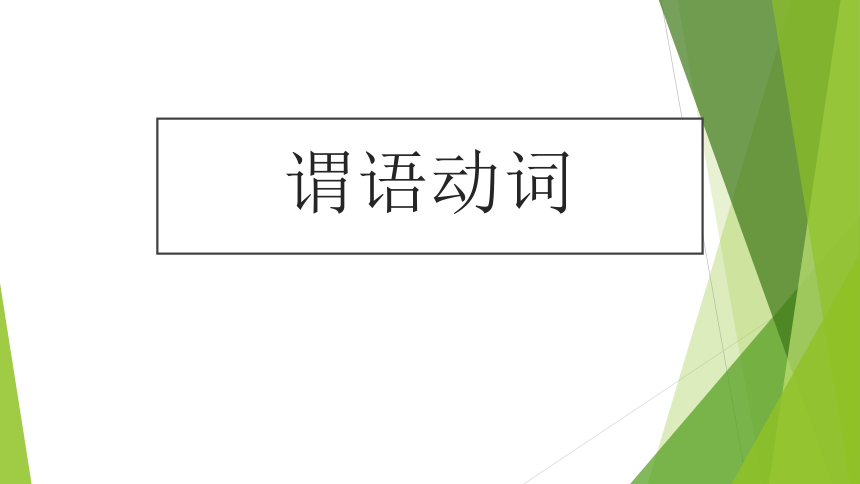 | |
| 格式 | pptx | ||
| 文件大小 | 584.8KB | ||
| 资源类型 | 教案 | ||
| 版本资源 | 人教新目标(Go for it)版 | ||
| 科目 | 英语 | ||
| 更新时间 | 2023-09-09 17:41:27 | ||
图片预览


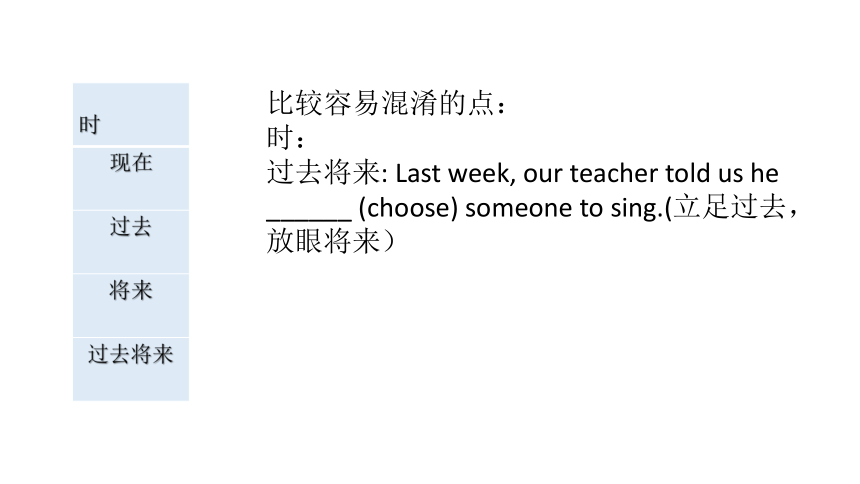
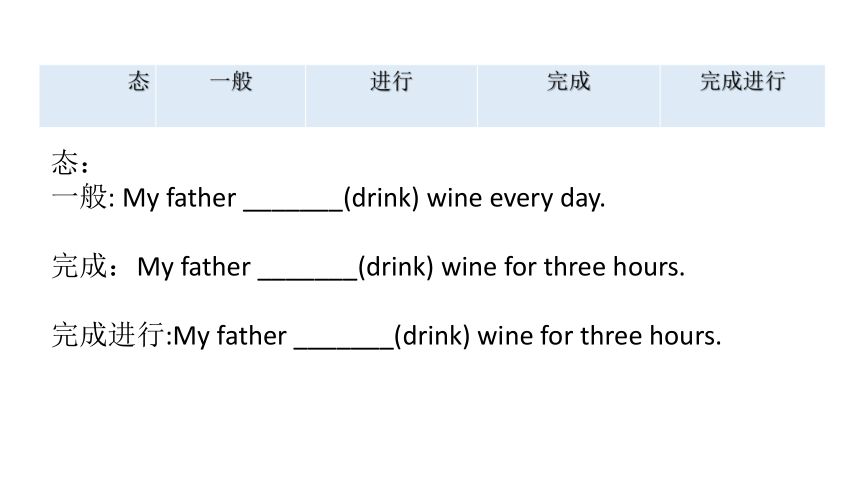
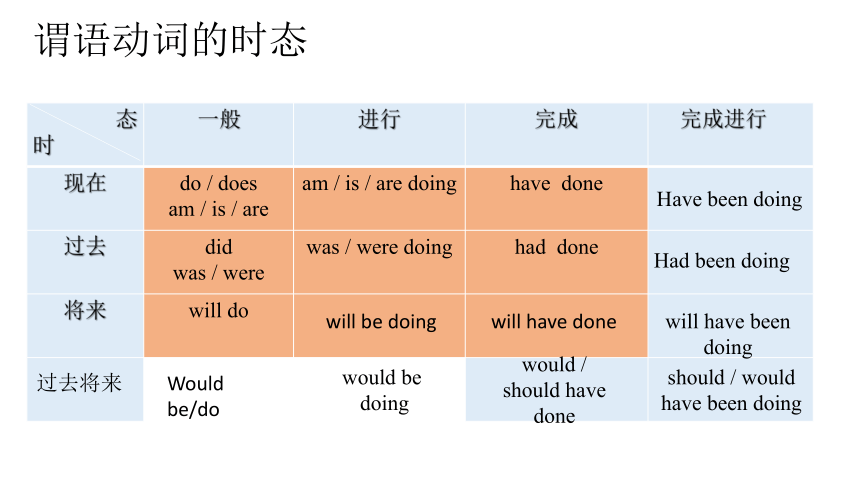
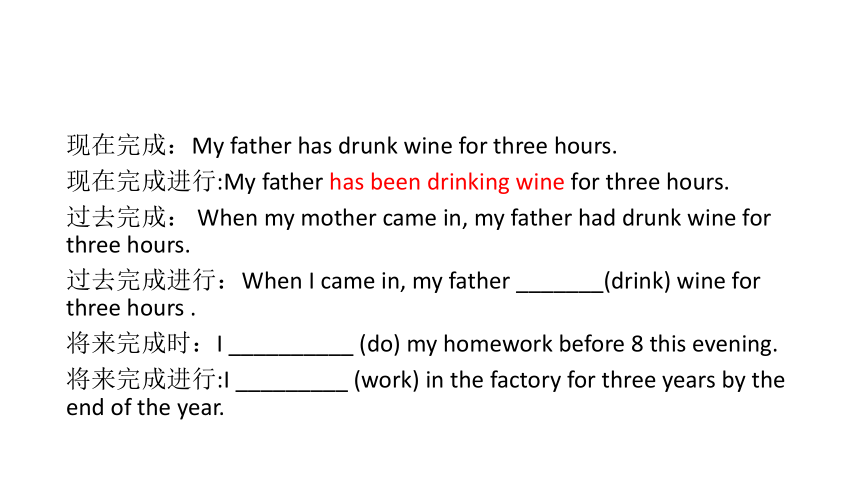
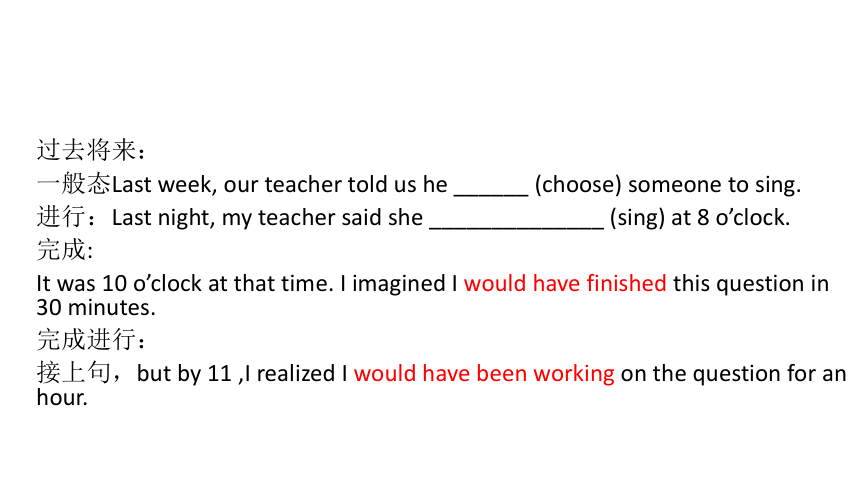
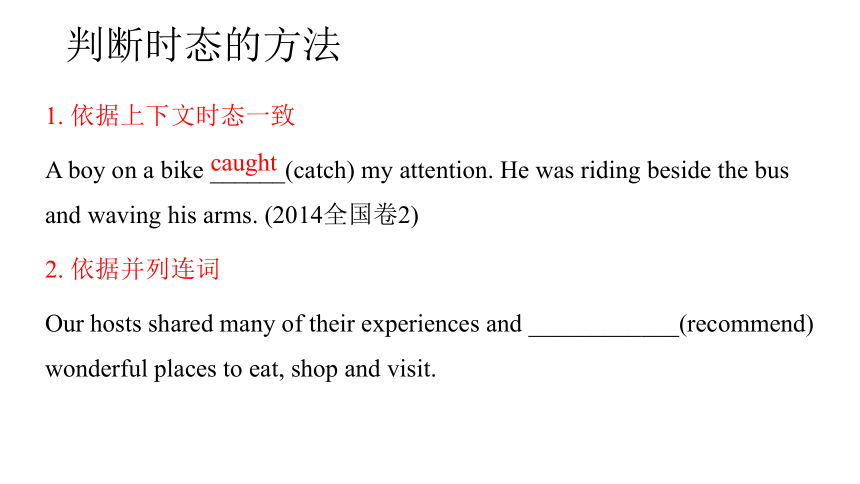

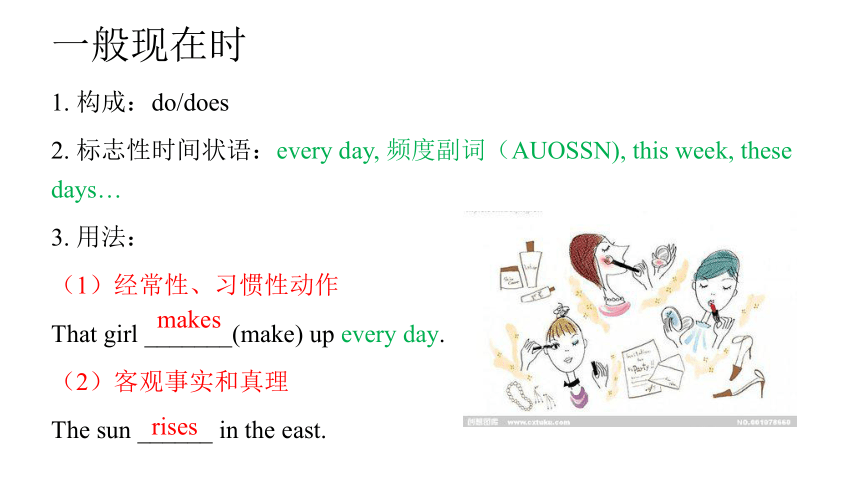
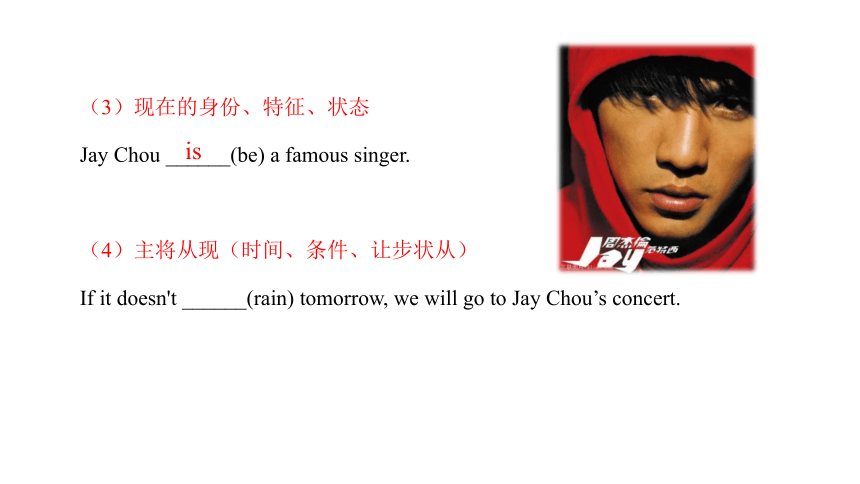
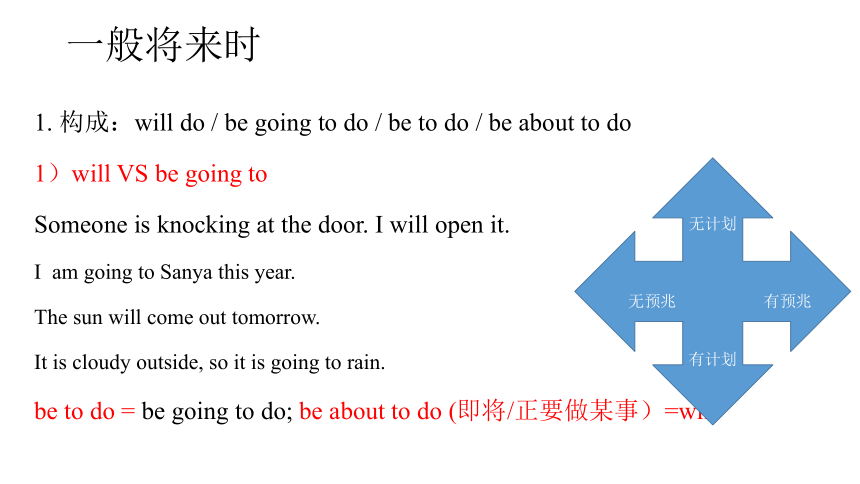
文档简介
(共36张PPT)
谓语动词
谓语动词的考点
1. 时态
2. 语态
3. 主谓一致
4. 情态动词
比较容易混淆的点:
时:
过去将来: Last week, our teacher told us he ______ (choose) someone to sing.(立足过去,放眼将来)
时
现在
过去
将来
过去将来
态 一般 进行 完成 完成进行
态:
一般: My father _______(drink) wine every day.
完成:My father _______(drink) wine for three hours.
完成进行:My father _______(drink) wine for three hours.
谓语动词的时态
态 时 一般 进行 完成
现在 do / does am / is / are am / is / are doing have done
过去 did was / were was / were doing had done
将来 will do
过去将来
完成进行
will be doing
will have done
Would be/do
would be
doing
would / should have done
Have been doing
Had been doing
will have been doing
should / would
have been doing
现在完成:My father has drunk wine for three hours.
现在完成进行:My father has been drinking wine for three hours.
过去完成: When my mother came in, my father had drunk wine for three hours.
过去完成进行:When I came in, my father _______(drink) wine for three hours .
将来完成时:I __________ (do) my homework before 8 this evening.
将来完成进行:I _________ (work) in the factory for three years by the end of the year.
过去将来:
一般态Last week, our teacher told us he ______ (choose) someone to sing.
进行:Last night, my teacher said she ______________ (sing) at 8 o’clock.
完成:
It was 10 o’clock at that time. I imagined I would have finished this question in 30 minutes.
完成进行:
接上句,but by 11 ,I realized I would have been working on the question for an hour.
判断时态的方法
1. 依据上下文时态一致
A boy on a bike ______(catch) my attention. He was riding beside the bus and waving his arms. (2014全国卷2)
2. 依据并列连词
Our hosts shared many of their experiences and ____________(recommend) wonderful places to eat, shop and visit.
caught
3. 依据时间状语/标志词
In 1969, the pollution______ (be) terrible along the Cuyahoga River.
一般过去时 yesterday, last week (month, year) ago, in 1992
一般现在时 always, sometimes, often, usually,
every week(day, year, month), on Sundays (Mondays…)
4. 特殊情况
I was fond of playing football when I was young, but I ______(like) playing basketball now.
一般现在时
1. 构成:do/does
2. 标志性时间状语:every day, 频度副词(AUOSSN), this week, these days…
3. 用法:
(1)经常性、习惯性动作
That girl _______(make) up every day.
(2)客观事实和真理
The sun ______ in the east.
makes
rises
(3)现在的身份、特征、状态
Jay Chou ______(be) a famous singer.
(4)主将从现(时间、条件、让步状从)
If it doesn't ______(rain) tomorrow, we will go to Jay Chou’s concert.
is
一般将来时
1. 构成:will do / be going to do / be to do / be about to do
1)will VS be going to
Someone is knocking at the door. I will open it.
I am going to Sanya this year.
The sun will come out tomorrow.
It is cloudy outside, so it is going to rain.
be to do = be going to do; be about to do (即将/正要做某事)=will
无计划
无预兆 有预兆
有计划
现在进行时
1. 构成:am/is/are + doing
2. 标志词:now, at present, at the moment
3. 用法:(1)表示说话时正在进行的动作
Please don’t make so much noise. I _____________ (study) now.
思考:doing一定只表示进行时态吗?
am studying
(2)表现阶段正在进行的动作
These days our doctors and nurses ______________ (fight) with the disease.
(3)与always, forever, continually, constantly 连用,表极端愉快/不愉快的情绪
You are always __________ (mess) up the kitchen.
过去进行时
1. 构成:was/were + doing
2. 用法:表示过去特定时刻正在发生的事情
My father was _____________ (drink) wine at 8 o’clock last night.
标志词:then, at that time/moment, at 时间点, last+
I was doing my homework then/at that time.
将来进行时
1. 构成:will be + doing
2. 用法:表将来某一特定的时刻正在进行的动作
I ___________ (lie) on a beach in Sanya this time at the end of the year.
You are always ________(ignore) me .
Ladies and gentlemen, please fasten your seat belts. The plane ________. (take off)
While I _____________ (watch) TV,the bell rang.
This time tomorrow we ___________ (sit) in the cinema and ________ (watch) a film.
Professor Smith, along with his assistants, __________ (work)on the project day and night to meet the deadline.
练习
现在完成时 构成:have/has + done(过去分词)
2. 用法:(1)表示动作/状态一直持续到现在或者对现在有影响
8——————now—
3,常见标志词:
1, Since接时间点; 自从 例:Tony has lived here since ten years ago.
2, For 接时间段 例:Tony has lived here for ten years.
3, Already,yet 已经 例:I have already finished my work.
Have you finished your work yet -No, I haven’t finished my work yet.
现在完成时 7 ——————now—
4, Up to now/ By now 例:Up to now, I have read about 3000 books.
He _____ football for three years when he was young.
5,“最高级”或“序数词”固定句型
This is the best tea that I have drunk.
This/It is the first time that I have come here.
Over the past ……years
区别1-概念
一般过去时:只表示动作在过去某一时刻发生,不表示和现在的关系,现在情况可能已发生变化。
Who opened the door
(“谁开的门?”只强调过去开门这一动作,门现在可能已关上。)
①现在完成时:强调的是与现在的关系,如对现在产生的结果或影响等,属于现在时范围,谈论的是现在的情况。
Who has opened the door
(“谁把门开了?”强调门现在依然还开着。)
区别2-标志词
一般过去时:
与明确的过去时间状语连用, three days ago, last year, yester。day, last Sunday, in2008。
He finished reading the book the day before yesterday.
现在完成时:
不能与明确的过去时间状语连用,如:three days ago 等等。如有以上这些明确的过去时间状语,也应用一般过去时。
标志词:Since, for, up to now, already, yet
My cousin has been in Nanjing since 2009.
同时存在:He _____ football for three years when he was young.
区别3-时间状语
一般过去时:
this morning, this month, tonight
表示与“现在”无关,时间已成为过去。
I saw him this morning.
(时间已不在上午了。)
现在完成时:
this morning, this month, tonight
表示包括“现在”在内。
I have seen him this morning.
(说话时间还是上午。)
区别3-疑问代词
一般过去时:
when后只用一般过去时表示已发生的动作。
--When did the train leave
--The train has left.
现在完成时:
不与when引导的特殊疑问句连用,但可与where, why等疑问词连用。
如:Where have you been (你去过哪里了?)
现在完成时 vs 一般过去时
翻译
现在完成时翻译成“已经”,一般过去时翻译成“了”
I have eaten three apples. 我已经吃了三个苹果。
I ate three apples yesterday. 我吃了三个苹果。
现在完成时VS一般过去时
概念 标志词 翻译
疑问代词
一般过去时 在过去终止 Last +, yesterday 已经 所有
现在完成时 延续到现在或对现在有影响 Since, for, up to now, already, yet 了 不能在when 后
练习
We __________ (work) on this project for four hours. Let's have a rest.
The country life ___________ (change) greatly since 1992.
It was raining lightly when I __________(arrive) in Yangshuo just before dawn.
The three of us __________ (travel) around Europe for about a month last summer.
过去完成时
构成:had + done 7 —————8————now—
即句子中的动作发生在“过去的过去” 某个时间点的过去。
常见标志词:
By the end of 截止到;例:By the end of the year, we had learned about 1000 words.
Before/by 在……之前; 例:Before he came to the US , he had learned about 1000 words.
现在完成时VS过去完成时
概念
标志词
过去完成时 过去的过去已经完成 By the end of ;
before
现在完成时 已经完成 Since, for, up to now, already, yet,
Up to now
7 —————8————now—
过去完成时:I had learned 3000 words by the end of last year.
现在完成时:I have learned 3000 words by now.
现在完成进行时vs现在完成时
概念:现在完成进行时,是指过去发生的动作延续到现在,还会继续延续
「现在完成时」:I have been single for five years.
「现在完成进行时」:I have been being single for five years.
8—————now————9—
When Alice came to, she did not know how long she __________(lie) there.
He kept looking at her, wondering whether he __________ (see) her somewhere.
If the weather had been better, we could have had a picnic. But it _________(rain) all day.
We first met on a train in 2000.We both felt immediately that we ________(know)each other for years.
If you don't like the drink you __________ (order), just leave it and try a different one.
Shakespeare's play Hamlet __________ (make) into at least ten different films over the past years.
练习
But at the moment, school __________ (come) first. I don't want to get too absorbed in modeling. (2017全国2)
Though the interview __________ (go) well, it was impressed on him again that compared with the other candidates.
Last week, the Denver Museum of Nature and Science __________ (hold) a “Girls and Science Day.”
My school goes from kindergarten to 6th grade.I ______ (be) a 6th grader.
Fast food __________ (be) full of fat and salt; by eating more fast food people will get more salt and fat than they need in their diet.
Thank you
过去将来时
1. 构成:would do
2. 用法:表示从过去的某时间看 将要发生的动作或存在的状态
They were sure that they______________ (succeed).
She told us that she _____________(not go) with us, if it rained.
would succeed
would not go
练一练
I said I ______________(arrange) everything.
I didn't know when she ___________(come), but when she came I would let you know.
would arrange
would come
练习
I _________ (have) an exciting party last weekend.
They all _________(go) to the mountains yesterday morning.
She _________(visit) her aunt last weekend.
When my brother was a teenager, he ______ (play) table tennis almost everyday.
I ________(empty) my purse change into the hands of a homeless man and helped a struggling woman reverse park.
had
went
visited
emptied
played
练习
Beijing _____(be) really beautiful. A study of travelers conducted by the website Trip Advisor names Beijing as one of the top 10 destinations in the world. (2017年全国卷1)
is
谓语动词
谓语动词的考点
1. 时态
2. 语态
3. 主谓一致
4. 情态动词
比较容易混淆的点:
时:
过去将来: Last week, our teacher told us he ______ (choose) someone to sing.(立足过去,放眼将来)
时
现在
过去
将来
过去将来
态 一般 进行 完成 完成进行
态:
一般: My father _______(drink) wine every day.
完成:My father _______(drink) wine for three hours.
完成进行:My father _______(drink) wine for three hours.
谓语动词的时态
态 时 一般 进行 完成
现在 do / does am / is / are am / is / are doing have done
过去 did was / were was / were doing had done
将来 will do
过去将来
完成进行
will be doing
will have done
Would be/do
would be
doing
would / should have done
Have been doing
Had been doing
will have been doing
should / would
have been doing
现在完成:My father has drunk wine for three hours.
现在完成进行:My father has been drinking wine for three hours.
过去完成: When my mother came in, my father had drunk wine for three hours.
过去完成进行:When I came in, my father _______(drink) wine for three hours .
将来完成时:I __________ (do) my homework before 8 this evening.
将来完成进行:I _________ (work) in the factory for three years by the end of the year.
过去将来:
一般态Last week, our teacher told us he ______ (choose) someone to sing.
进行:Last night, my teacher said she ______________ (sing) at 8 o’clock.
完成:
It was 10 o’clock at that time. I imagined I would have finished this question in 30 minutes.
完成进行:
接上句,but by 11 ,I realized I would have been working on the question for an hour.
判断时态的方法
1. 依据上下文时态一致
A boy on a bike ______(catch) my attention. He was riding beside the bus and waving his arms. (2014全国卷2)
2. 依据并列连词
Our hosts shared many of their experiences and ____________(recommend) wonderful places to eat, shop and visit.
caught
3. 依据时间状语/标志词
In 1969, the pollution______ (be) terrible along the Cuyahoga River.
一般过去时 yesterday, last week (month, year) ago, in 1992
一般现在时 always, sometimes, often, usually,
every week(day, year, month), on Sundays (Mondays…)
4. 特殊情况
I was fond of playing football when I was young, but I ______(like) playing basketball now.
一般现在时
1. 构成:do/does
2. 标志性时间状语:every day, 频度副词(AUOSSN), this week, these days…
3. 用法:
(1)经常性、习惯性动作
That girl _______(make) up every day.
(2)客观事实和真理
The sun ______ in the east.
makes
rises
(3)现在的身份、特征、状态
Jay Chou ______(be) a famous singer.
(4)主将从现(时间、条件、让步状从)
If it doesn't ______(rain) tomorrow, we will go to Jay Chou’s concert.
is
一般将来时
1. 构成:will do / be going to do / be to do / be about to do
1)will VS be going to
Someone is knocking at the door. I will open it.
I am going to Sanya this year.
The sun will come out tomorrow.
It is cloudy outside, so it is going to rain.
be to do = be going to do; be about to do (即将/正要做某事)=will
无计划
无预兆 有预兆
有计划
现在进行时
1. 构成:am/is/are + doing
2. 标志词:now, at present, at the moment
3. 用法:(1)表示说话时正在进行的动作
Please don’t make so much noise. I _____________ (study) now.
思考:doing一定只表示进行时态吗?
am studying
(2)表现阶段正在进行的动作
These days our doctors and nurses ______________ (fight) with the disease.
(3)与always, forever, continually, constantly 连用,表极端愉快/不愉快的情绪
You are always __________ (mess) up the kitchen.
过去进行时
1. 构成:was/were + doing
2. 用法:表示过去特定时刻正在发生的事情
My father was _____________ (drink) wine at 8 o’clock last night.
标志词:then, at that time/moment, at 时间点, last+
I was doing my homework then/at that time.
将来进行时
1. 构成:will be + doing
2. 用法:表将来某一特定的时刻正在进行的动作
I ___________ (lie) on a beach in Sanya this time at the end of the year.
You are always ________(ignore) me .
Ladies and gentlemen, please fasten your seat belts. The plane ________. (take off)
While I _____________ (watch) TV,the bell rang.
This time tomorrow we ___________ (sit) in the cinema and ________ (watch) a film.
Professor Smith, along with his assistants, __________ (work)on the project day and night to meet the deadline.
练习
现在完成时 构成:have/has + done(过去分词)
2. 用法:(1)表示动作/状态一直持续到现在或者对现在有影响
8——————now—
3,常见标志词:
1, Since接时间点; 自从 例:Tony has lived here since ten years ago.
2, For 接时间段 例:Tony has lived here for ten years.
3, Already,yet 已经 例:I have already finished my work.
Have you finished your work yet -No, I haven’t finished my work yet.
现在完成时 7 ——————now—
4, Up to now/ By now 例:Up to now, I have read about 3000 books.
He _____ football for three years when he was young.
5,“最高级”或“序数词”固定句型
This is the best tea that I have drunk.
This/It is the first time that I have come here.
Over the past ……years
区别1-概念
一般过去时:只表示动作在过去某一时刻发生,不表示和现在的关系,现在情况可能已发生变化。
Who opened the door
(“谁开的门?”只强调过去开门这一动作,门现在可能已关上。)
①现在完成时:强调的是与现在的关系,如对现在产生的结果或影响等,属于现在时范围,谈论的是现在的情况。
Who has opened the door
(“谁把门开了?”强调门现在依然还开着。)
区别2-标志词
一般过去时:
与明确的过去时间状语连用, three days ago, last year, yester。day, last Sunday, in2008。
He finished reading the book the day before yesterday.
现在完成时:
不能与明确的过去时间状语连用,如:three days ago 等等。如有以上这些明确的过去时间状语,也应用一般过去时。
标志词:Since, for, up to now, already, yet
My cousin has been in Nanjing since 2009.
同时存在:He _____ football for three years when he was young.
区别3-时间状语
一般过去时:
this morning, this month, tonight
表示与“现在”无关,时间已成为过去。
I saw him this morning.
(时间已不在上午了。)
现在完成时:
this morning, this month, tonight
表示包括“现在”在内。
I have seen him this morning.
(说话时间还是上午。)
区别3-疑问代词
一般过去时:
when后只用一般过去时表示已发生的动作。
--When did the train leave
--The train has left.
现在完成时:
不与when引导的特殊疑问句连用,但可与where, why等疑问词连用。
如:Where have you been (你去过哪里了?)
现在完成时 vs 一般过去时
翻译
现在完成时翻译成“已经”,一般过去时翻译成“了”
I have eaten three apples. 我已经吃了三个苹果。
I ate three apples yesterday. 我吃了三个苹果。
现在完成时VS一般过去时
概念 标志词 翻译
疑问代词
一般过去时 在过去终止 Last +, yesterday 已经 所有
现在完成时 延续到现在或对现在有影响 Since, for, up to now, already, yet 了 不能在when 后
练习
We __________ (work) on this project for four hours. Let's have a rest.
The country life ___________ (change) greatly since 1992.
It was raining lightly when I __________(arrive) in Yangshuo just before dawn.
The three of us __________ (travel) around Europe for about a month last summer.
过去完成时
构成:had + done 7 —————8————now—
即句子中的动作发生在“过去的过去” 某个时间点的过去。
常见标志词:
By the end of 截止到;例:By the end of the year, we had learned about 1000 words.
Before/by 在……之前; 例:Before he came to the US , he had learned about 1000 words.
现在完成时VS过去完成时
概念
标志词
过去完成时 过去的过去已经完成 By the end of ;
before
现在完成时 已经完成 Since, for, up to now, already, yet,
Up to now
7 —————8————now—
过去完成时:I had learned 3000 words by the end of last year.
现在完成时:I have learned 3000 words by now.
现在完成进行时vs现在完成时
概念:现在完成进行时,是指过去发生的动作延续到现在,还会继续延续
「现在完成时」:I have been single for five years.
「现在完成进行时」:I have been being single for five years.
8—————now————9—
When Alice came to, she did not know how long she __________(lie) there.
He kept looking at her, wondering whether he __________ (see) her somewhere.
If the weather had been better, we could have had a picnic. But it _________(rain) all day.
We first met on a train in 2000.We both felt immediately that we ________(know)each other for years.
If you don't like the drink you __________ (order), just leave it and try a different one.
Shakespeare's play Hamlet __________ (make) into at least ten different films over the past years.
练习
But at the moment, school __________ (come) first. I don't want to get too absorbed in modeling. (2017全国2)
Though the interview __________ (go) well, it was impressed on him again that compared with the other candidates.
Last week, the Denver Museum of Nature and Science __________ (hold) a “Girls and Science Day.”
My school goes from kindergarten to 6th grade.I ______ (be) a 6th grader.
Fast food __________ (be) full of fat and salt; by eating more fast food people will get more salt and fat than they need in their diet.
Thank you
过去将来时
1. 构成:would do
2. 用法:表示从过去的某时间看 将要发生的动作或存在的状态
They were sure that they______________ (succeed).
She told us that she _____________(not go) with us, if it rained.
would succeed
would not go
练一练
I said I ______________(arrange) everything.
I didn't know when she ___________(come), but when she came I would let you know.
would arrange
would come
练习
I _________ (have) an exciting party last weekend.
They all _________(go) to the mountains yesterday morning.
She _________(visit) her aunt last weekend.
When my brother was a teenager, he ______ (play) table tennis almost everyday.
I ________(empty) my purse change into the hands of a homeless man and helped a struggling woman reverse park.
had
went
visited
emptied
played
练习
Beijing _____(be) really beautiful. A study of travelers conducted by the website Trip Advisor names Beijing as one of the top 10 destinations in the world. (2017年全国卷1)
is
同课章节目录
- 词法
- 名词
- 动词和动词短语
- 动词语态
- 动词时态
- 助动词和情态动词
- 非谓语动词
- 冠词
- 代词
- 数词和量词
- 形容词副词及其比较等级
- 介词和介词短语
- 连词和感叹词
- 构词法
- 相似、相近词比较
- 句法
- 陈述句
- 一般疑问句和否定疑问句
- 特殊疑问句及选择疑问句
- 反意疑问句
- 存在句(There be句型)
- 宾语从句
- 定语从句
- 状语从句
- 主谓一致问题
- 简单句
- 并列句
- 复合句
- 主谓一致
- 主、表语从句
- 名词性从句
- 直接引语和间接引语
- 虚拟语气
- 感叹句
- 强调句
- 倒装句
- 祈使句
- 句子的成分
- 句子的分类
- 题型专区
- 单项选择部分
- 易错题
- 完形填空
- 阅读理解
- 词汇练习
- 听说训练
- 句型转换
- 补全对话
- 短文改错
- 翻译
- 书面表达
- 任务型阅读
- 语法填空
- 其他资料
